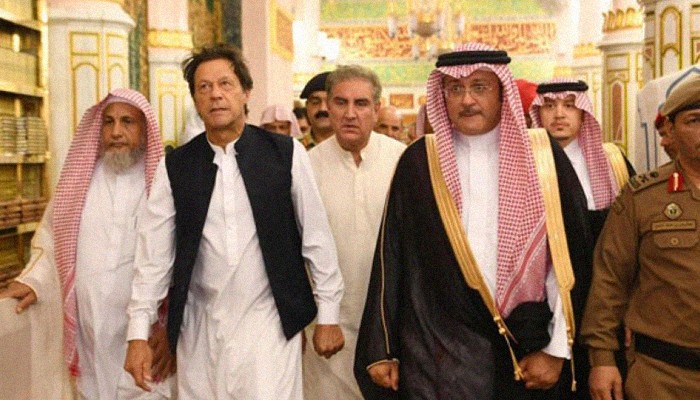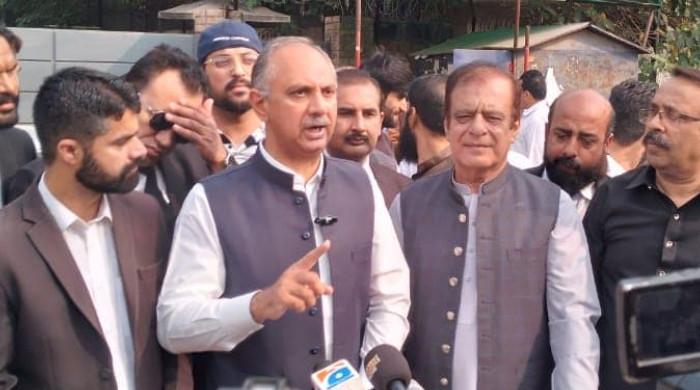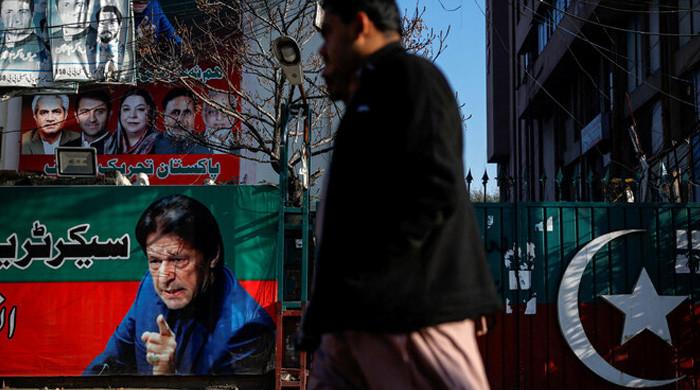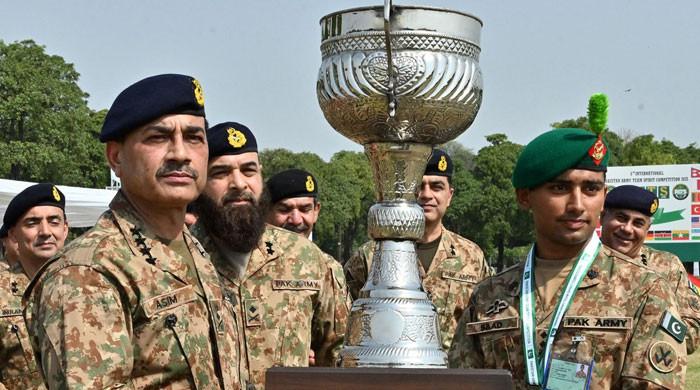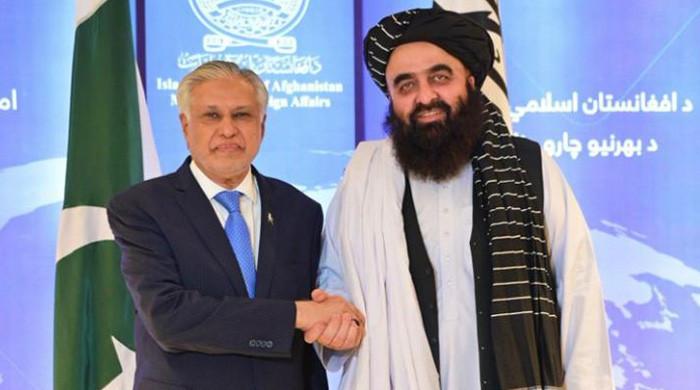PM Imran says Pakistan needs loans to repay debt
Addressing the investment conference in Riyadh, PM Imran said immediate concern for our government is to increase our exports so we can bolster our foreign exchange reserves
October 23, 2018
RIYADH: Prime Minister Imran Khan on Tuesday addressed the Future Investment Initiative (FII) conference in Saudi Arabia and highlighted some of the key challenges facing his government and his plans to tackle them.
"Whatever reforms we do today the impact will be in three months, six months or a years time. Right now we need loans to go through this difficult period of repaying or servicing our debt for our imports," the premier said while speaking about Pakistan's current economic situation. "Right now we are talking to the International Monetary Fund and also to friendly countries," he added.
Stating that his government has been in power for 60 days, the premier said, "The immediate concern for our government is to increase our exports so we can bolster our foreign exchange reserves."
Warning that the next three to six months will be difficult for Pakistan, PM Imran said, "Our institutions were destroyed as corrupt people were in top positions but we are taking measures to increase exports."
"Pakistan's strength is overseas Pakistanis and we have to make conditions favourable for them to invest in the country," he said. The premier announced, "We are working to create a favourable environment for investment in the country and will introduce a one-window operation for it."
"We need to increase foreign reserves with remittances from the 8 to 9 million Pakistanis working abroad, need to give incentives to exporters and create opportunities for investment,” he added.
He also asserted, "We need to clamp down on money laundering and are taking measures."
Speaking about his Naya Pakistan Housing Programme, PM Imran said, "There is a need for 10 million houses in Pakistan and we have embarked on a programme to build 5 million houses in the initial phase."
PM Imran also announced, "We are restructuring our duty and tax structure."
The premier further said, "Pakistan is a country with great potential and is one of the most diverse countries in the world."
"This is the best time for investors to come to Pakistan," he added. PM Imran further said he has spoken to Saudi Crown Prince Mohammed bin Salman about boosting investment ties between the two countries.
"There is a vast amount of mineral wealth in Pakistan. We have some of the largest gold reserves in the world, as well as reserves of copper and zinc," he added. Regretting that mineral reserves in Pakistan could not be extracted due to terrorism and corruption, PM Imran maintained, "This will change now."
"There was hardly any investment in our mineral resources and one of the reasons as I pointed out was the war on terror as investors would not return to Pakistan. We also had very poor governance and corruption," he added. "Pakistan suffered a lot from terrorism post-9/11 but now, thanks to our security forces and intelligence agencies, we have controlled terrorism."
PM Imran further highlighted. "Tourism is also a vital sector and has flourished in recent years. We want to give incentives to people in energy sector."
"Pakistan’s biggest resource are its people below the age of 30," he maintained. The premier lamented that information technology was not focused on earlier, but said, "Our government is giving importance to the IT sector."
'Have asked China to help eliminate corruption, poverty'
Upholding that Pakistan's two biggest problems are corruption and poverty, PM Imran said, "We have asked the Chinese government to help us with eliminating corruption and poverty alleviation.
"In the past five years, China has clamped down on corruption and we have to look for ways to curb it as white collar crime is hard to convict. Secondly, they have pulled out a large amount of people out of poverty," he added.
The premier also hailed the China-Pakistan Economic Corridor "as very important" for Pakistan and said that the project increased the country's strategic importance. "China is a huge market for Pakistan and economic zones such as Gwadar are being developed."
'Need peace and stability most right now'
PM Imran further stressed, "What Pakistan needs most right now is peace and stability. One of the reasons we are at this stage is because of instability and war."
Responding to a question regarding relations with neighbours, the prime minister said, "Pakistan's relations, especially with Afghanistan and India, are crucial." He, however, expressed disappointment that India did not respond to Pakistan's initiative for dialogue.
"We need stability and that means peace with all neighbours. Our problems right now are with Afghanistan and India but I am afraid we received no response from India, in fact, we got rebuffed by New Delhi," he said.
"Now what we are hoping is that we wait until the elections then again we will resume our peace talks with India," he added, referring to upcoming national polls scheduled to take place by mid-May in India.
Regarding the measures his government is taking for the empowerment of women, PM Imran said, "You can only empower women if you educate them. When we were in power in Khyber Pakhtunkhwa, we decided that for every 100 colleges built 70 would be for women."
"Our housing project will also involve women. Women also do not get their inheritance rights as mentioned in the Shariah law so we are also working to financially empower them and ensure that they get their rights," he said.
PM Imran meets Saudi King
Prime Minister Imran Khan along with his delegation met Saudi King Shah Salman Abdul Aziz at the Royal Palace.
During the meeting views were exchanged on bilateral relations and the global political situation. The two leaders also discussed matters pertaining to mutual interest, trade, investment and economic ties.
The Pakistani delegation included Foreign Minister Shah Mehmood Qureshi, Information Minister Fawad Chaudhry, Finance Minister Asad Umar and Minister for Industries Razaq Dawood.
PM in Saudi Arabia
The premier arrived in Saudi Arabia on Monday on a two-day official visit to attend the investment conference that numerous other world leaders and corporates have skipped over the issue of dissident journalist Jamal Khashoggi's death.
Khan, who landed in Medina and was welcomed by Governor Faisal bin Salman bin Abdulaziz Al Saud, paid a visit to the Roza-e-Rasool (PBUH) before departing for Riyadh to attend the Future Investment Initiative (FII) conference.
In Riyadh, Governor Faisal bin Bandar Al Saud and Khan Hasham Bin Saddique, the Pakistani Ambassador to Saudi Arabia, welcomed him at the King Khalid International Airport.
“The reason I feel I have to avail myself of this opportunity is because, in a country of 210 million people right now, we have the worst debt crisis in our history," he mentioned to the Middle East Eye (MEE) in an interview that was published on Monday.
The prime minister is also slated to meet Crown Prince Mohammed bin Salman, who, himself, is surrounded by controversy in what the world is calling Riyadh's alleged involvement in the orchestration of Khashoggi's murder in the Saudi consulate in Istanbul, Turkey.
The Pakistani premier told an interviewer before leaving for Riyadh that despite his concern over Khashoggi’s death, he could not skip the conference as “we’re desperate” for possible Saudi loans to shore up Pakistan’s economy.
“Unless we get loans from friendly countries or the IMF [International Monetary Fund], we actually won’t have, in another two or three months, enough foreign exchange to service our debts or to pay for our imports. So we’re desperate at the moment.”
PM Imran is accompanied by Shah Mehmood Qureshi, Asad Umar, and Fawad Chaudhry, the ministers of foreign affairs, finance, and information, respectively, as well as Pakistan Board of Investment Chairperson Haroon Sharif and renowned economist Abdul Razak Dawood, the adviser to the premier on commerce, textiles, industries production, and investment.
